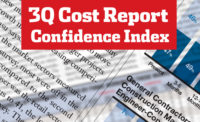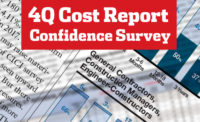The COVID-19 pandemic is now into its 10th month, and a second wave of the virus is hitting the country hard. However, the prospects of a vaccine are giving many industry firms hope that the construction market may start to recover later in 2021.
The concern about the emergence of COVID-19 can be seen in the results of ENR’s latest Construction Industry Confidence Index survey. The index, which had plunged 20 points to a 36 rating in the second quarter of 2020, and edged up two points in the third quarter, continues to advance very slowly, as the CICI Index now is up only two more points, to a 40 rating.
The index measures executive sentiment about the current market, where it will be in the next three to six months and over a 12- to 18-month period. A rating above 50 shows a growing market. The measure is based on 364 responses by industry execs to surveys sent between Nov. 8 and Dec. 7 to 6,000 U.S. companies on ENR’s lists of leading general contractors, subcontractors and design firms.
Many industry execs believe the industry will be back in a growth mode by the end of 2021. Only 9% of respondents believe the current market has bottomed out and is back in a growth mode, compared to 45% who believe it is still declining. On the other hand, 41% believe that the market will be growing in 12 to 18 months, compared to only 22% who believed it will still be in decline.
|
Related Link |
CFMA: CFOs Looking for Turnaround
Another barometer is the soon-to-be-released results of the latest Confindex survey from the Princeton, N.J.-based Construction Financial Management Association (CFMA), which shows that chief financial officers are worried about the near term but believe that the end of 2021 will see a rebound in the market.
Each quarter, CFMA polls 200 CFOs from general and civil contractors and subcontractors about markets and business conditions. The Confindex is based on four separate financial and market components, each rated on a scale of 1 to 200. A rating of 100 indicates a stable market; higher ratings indicate market growth.
“The Confindex rose to a 93 rating from an 87 rating in the previous quarter,” says Stuart Binstock, CFMA’s CEO. The “business conditions” component of the Confindex also rose, going from 71 in the previous quarter to an 80 rating in this quarter, reflecting continued concern about the current market.
The “financial conditions” component gained three points to 103, from 100, and the “current conditions” component rose four points to an 83 rating. More significantly, the “year-ahead outlook” rose to 105 from 98, a positive rating showing the belief that the market will begin to grow again at the end of 2021.
Binstock notes that CFMA’s Confindex survey also asked how long CFOs believed it would take for the market to recover from the COVID-19 downturn. Of the CFOs surveyed, 31.0% believed that the market is already beginning to recover, compared to 25.6% last quarter.
A Glimmer of Hope
One of the reasons for hope is that the U.S. economy has been bouncing back from its plunge during the spring. “The economy had been in recovery since May, and the numbers have been much better than expected,” says Anirban Basu, CEO of economic consultant Sage Policy Group, Baltimore, and a CFMA adviser.
“The economy is bad, but not as bad as we thought it would be at this point,” says Basu. However, he cautions that while the U.S. economy seems to be making a V-shaped rebound, it is too soon to tell whether construction will follow suit.
Another positive indicator from the Confindex survey is that the primary concern of CFMA members is once again staff shortages. Staffing had long been the No. 1 concern of CFOs in the survey until it dropped below market concerns in the third quarter, Binstock notes. However, in this quarter, 47% of Confindex respondents said they were concerned about skills shortages, compared to 43% who were concerned about getting new work.
This worry about maintaining staff can be seen in the CICI survey. ENR asked respondents whether they planned to add to staff in 2021. Of those responding to the question, 49.9% said they did plan to add new employees in 2021. While this is well below last year’s level, where 82.8% of respondents said they planned to add staff in 2020, it still shows that many firms believe there will be a need for new employees in 2021.
ENR also asked whether respondents planned to raise or cut salaries in 2021. Of those responding, 54.1% said they planned to give raises, while 39.2% said they planned to keep salaries as they are. Only 2.8% said that pay cuts were on the agenda. ENR also asked the levels of anticipated raises. There were 235 firms that provided data on anticipated raise levels, with an average raise of 3.64%.
The COVID-19 crisis clearly has taken its toll on the markets, and no one knows what 2021 will bring. However, there is a growing hope that the market will slowly turn around and be back on positive footing by the end of next year. “The general feeling is that in a year, the market will be back. It won’t be as good as where we were a year ago, but it won’t be as bad as now,” says Basu.






Post a comment to this article
Report Abusive Comment